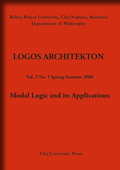HOW PARADOXICAL IS THE LIAR PARADOX?
HOW PARADOXICAL IS THE LIAR PARADOX?
Author(s): Maria FrapolliSubject(s): Philosophy
Published by: Presa Universitara Clujeana
Keywords: Truth; truth ascription; truth bearer; liar paradox; what is said; prosentence; contextualism; minimalism; pragmatism; categorical mistake
Summary/Abstract: The Liar Paradox has been generally understood as a serious difficulty for semantics and particularly for an adequate treatment of the notion of truth. Given the present state of language studies, this diagnostic is utterly unwarranted. To derive the paradox it is required for truth to be a property of sentence, but no contemporary theory of language accepts sentences as the bearers of truth. A preliminary conclusion is that what the liar paradox shows is precisely that making of sentences the truth bearers leads to contradictions. And this conclusion perfectly fits the contemporary theories of meaning. Radical Contextualism, Relevance Theory and Inferentialism are pragmatist proposals that place logical and semantic properties on what is said by utterances in context. Minimalism or Literalism, on the other end of the spectrum, also distinguishes between what is said and the meaning of sentences, and makes truth rest on the former. Then, placing the discussions about truth and the liar paradox in the realm of contemporary theories produces the dissolution of the paradox in a natural and non ad hoc way.
Journal: Logos Architekton. Journal of Logic and Philosophy of Science
- Issue Year: 2/2008
- Issue No: 02
- Page Range: 7-34
- Page Count: 28
- Language: English

